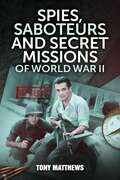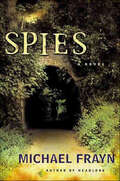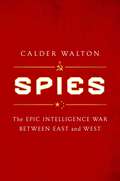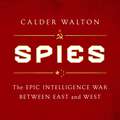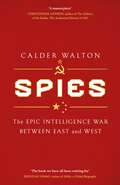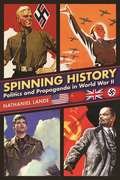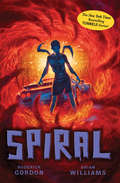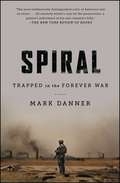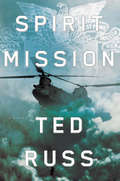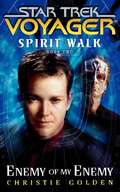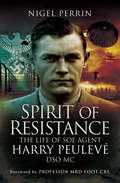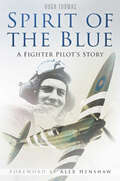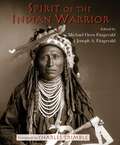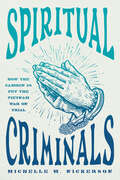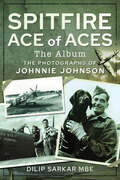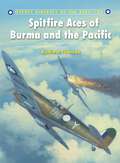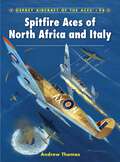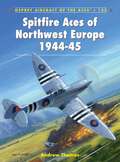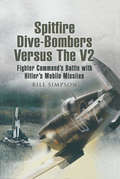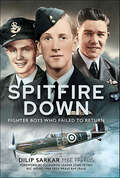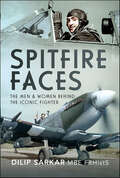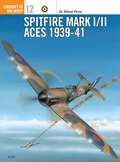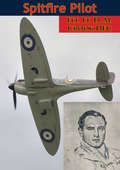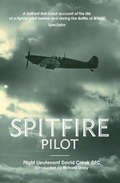- Table View
- List View
Spies, Saboteurs and Secret Missions of World War II
by Tony MatthewsWhat kind of courage does it take for an ordinary married couple to confront the Nazi regime of Hitler&’s vicious Third Reich? And why did two men betray their fellow secret agents after landing on American shores with the intention of carrying out sabotage attacks on a massive scale? Why did the Germans murder more than two hundred and sixty innocent men in retaliation for a botched Resistance attempt to steal a simple truckload of meat? From technical wizardry that goes disastrously wrong, to underwater warfare with a sting in its tail, this new book by Tony Matthews delves into a wide range of top-secret stories, including black propaganda missions, calamitous Resistance operations and accounts of espionage activities at the very highest level. Spies, Saboteurs and Secret Missions of World War II is a fascinating insight into some of the most astonishing clandestine activities of the Second World War.
Spies: A Novel
by Michael Frayn“A master of intellectual mystery masquerading as ripping popular entertainment . . . a gorgeous melancholy that shivers the mind.” —The New York Times Book ReviewFrom the author of bestselling Booker Prize finalist Headlong, a mesmerizing novel about secrecy and a child’s game turned deadly earnest.When Stephen Wheatley returns to the site of a dimly remembered but troubling childhood summer in wartime London, we are brought back to a quiet, suburban street where two boys, Keith and his sidekick-Stephen—are engaged in their own version of the war effort: spying on the neighbors, recording their movements, ferreting out their secrets.But then the boys’ game of espionage takes a sinister and unintended turn. A wife’s simple errands and a family’s ordinary rituals—once the focus of childish speculation—become the tragic elements of adult catastrophe.In gripping prose, Spies reaches into the moral confusion of youth to reveal a reality filled with deceptions and betrayals, where the bonds of friendship, marriage, and family are unraveled by cowardice and erotic desire.Michael Frayn powerfully demonstrates that what appears to be happening in front of our eyes often turns out to be something we can’t see at all.“A novel of extraordinary power and wisdom.” —The Baltimore Sun“Bernard Shaw couldn’t do it, Henry James couldn’t do it, but the ingenious English author Michael Frayn does do it: write novels and plays with equal success.” —John Updike, The New Yorker“Secrets assume an unexpected power and excitement as Frayn reveals that a little of the fascist is buried in every clever child, and that spying can be a soul-destroying game.” —Chicago Sun-Times
Spies: The Epic Intelligence War Between East and West
by Calder WaltonForeign Policy Best Book of 2023 Foreign Affairs Best Book of 2023 The &“riveting&” (The Economist), secret story of the hundred-year intelligence war between Russia and the West with lessons for our new superpower conflict with China.Spies is the history of the secret war that Russia and the West have been waging for a century. Espionage, sabotage, and subversion were the Kremlin&’s means to equalize the imbalance of resources between the East and West before, during, and after the Cold War. There was nothing &“unprecedented&” about Russian meddling in the 2016 US presidential election. It was simply business as usual, new means used for old ends. The Cold War started long before 1945. But the West fought back after World War II, mounting its own shadow war, using disinformation, vast intelligence networks, and new technologies against the Soviet Union. Spies is a &“deeply researched and artfully crafted&” (Fiona Hill, deputy assistant to the US President) story of the best and worst of mankind: bravery and honor, treachery and betrayal. The narrative shifts across continents and decades, from the freezing streets of St. Petersburg in 1917 to the bloody beaches of Normandy; from coups in faraway lands to present-day Moscow where troll farms, synthetic bots, and weaponized cyber-attacks being launched woefully unprepared West. It is about the rise and fall of Eastern superpowers: Russia&’s past and present and the global ascendance of China. Mining hitherto secret archives in multiple languages, Calder Walton shows that the Cold War started earlier than commonly assumed, that it continued even after the Soviet Union&’s collapse in 1991, and that Britain and America&’s clandestine struggle with the Soviet government provided key lessons for countering China today. This &“authoritative, sweeping&” (Fredrik Logevall, Pulitzer Prize–winning author of Embers of War) history, combined with practical takeaways for our current great power struggles, make Spies a unique and essential addition to the history of the Cold War and the unrolling conflict between the United States and China that will dominate the 21st century.
Spies: The epic intelligence war between East and West
by Calder WaltonThe riveting story of the hundred-year intelligence war between Russia and the West with lessons for our new superpower conflict with China'A masterpiece' CHRISTOPHER ANDREW, author of The Defence of the Realm: The Authorised History of MI5'The book we have all been waiting for' BRENDAN SIMMS, author of Hitler: A Global Biography'Gripping, authoritative... A vivid account of intelligence skulduggery' KirkusEspionage, election meddling, disinformation, assassinations, subversion, and sabotage - all attract headlines today about Putin's dictatorship. But they are far from new. The West has a long-term Russia problem, not a Putin problem. Spies mines hitherto secret archives and exclusive interviews with former agents to tell the history of the war that Russia and the West have been waging for a century. Espionage dark arts were the Kremlin's means to equalise the imbalance of arms between the East and West before, during and after the Cold War. There was nothing 'unprecedented' about Russian meddling in the 2016 US presidential election. It was business as usual, new means for old ends.The Cold War started long before 1945. Western powers gradually fought back after the Second World War, mounting their own shadow war, deploying propaganda, recruiting intelligence networks and pioneering new spy technologies against the Soviet Union. Spies is an inspiring, engrossing story of the best and worst of mankind: bravery and honour, treachery and betrayal. The narrative shifts across continents and decades, from the freezing streets of St. Petersburg in 1917 to the bloody beaches of Normandy; from coups in faraway lands to present-day Moscow, where troll farms weaponise social media against Western democracies. This fresh reading of history makes Spies a unique and essential addition to the story of the unrolling conflict between Russia, China and the West that will dominate the twenty-first century.
Spies: The epic intelligence war between East and West
by Calder WaltonThe riveting story of the hundred-year intelligence war between Russia and the West with lessons for our new superpower conflict with China'A masterpiece' CHRISTOPHER ANDREW, author of The Defence of the Realm: The Authorised History of MI5'The book we have all been waiting for' BRENDAN SIMMS, author of Hitler: A Global Biography'Gripping, authoritative... A vivid account of intelligence skulduggery' KirkusEspionage, election meddling, disinformation, assassinations, subversion, and sabotage - all attract headlines today about Putin's dictatorship. But they are far from new. The West has a long-term Russia problem, not a Putin problem. Spies mines hitherto secret archives and exclusive interviews with former agents to tell the history of the war that Russia and the West have been waging for a century. Espionage dark arts were the Kremlin's means to equalise the imbalance of arms between the East and West before, during and after the Cold War. There was nothing 'unprecedented' about Russian meddling in the 2016 US presidential election. It was business as usual, new means for old ends.The Cold War started long before 1945. Western powers gradually fought back after the Second World War, mounting their own shadow war, deploying propaganda, recruiting intelligence networks and pioneering new spy technologies against the Soviet Union. Spies is an inspiring, engrossing story of the best and worst of mankind: bravery and honour, treachery and betrayal. The narrative shifts across continents and decades, from the freezing streets of St. Petersburg in 1917 to the bloody beaches of Normandy; from coups in faraway lands to present-day Moscow, where troll farms weaponise social media against Western democracies. This fresh reading of history makes Spies a unique and essential addition to the story of the unrolling conflict between Russia, China and the West that will dominate the twenty-first century.
Spinning History: Politics and Propaganda in World War II
by Nathaniel LandeAn “original and insightful” look at World War II through the lens of theater, propaganda, and the most important performances in human history (Richard Cole, PhD). In this fascinating book, more relevant than ever in today’s political climate of “fake news” and “alternative facts,” bestselling author and historian Nathaniel Lande presents WWII as a drama staged and overseen by four contrasting masters: Roosevelt, Churchill, Hitler, and Stalin. Each man had his own script for elaborately produced campaigns of deception, winning hearts and minds on the frontlines and the home front. Each leader used all the tools at his disposal to promote his own narrative of the Second World War. Brilliantly conceived oratory was applied to underscore each vision. Impression management—the art of political spin—was employed to drive the message home. Each side employed uniforms, meticulously staged events, and broadcast their messages via all media available—motion pictures, radio broadcasts, songs, posters, leaflets, and beyond. The result of Lande’s exploration is “an illuminating, readable, and still very relevant account of the ways in which theatrical staging, dramatic storytelling, and message manipulation were key to the efforts of both sides during those turbulent years” (Richard Zoglin, senior editor, Time).
Spiral (Tunnels #5)
by Roderick Gordon Brian WilliamsSpinning out of control!Just when you thought it couldn't get any deeper, darker, or weirder...Creeping into the open through cracks in the earth, the Styx have surfaced, and are now infesting England like some parasitic scourge -- carriers of a bizarre black secret that will place every last Topsoiler in mortal peril. Unless Will Burrows puts a stop to the propagation.Armed to the teeth, with little more than a motley crew of former commandos as reinforcements, can Will, Chester, and Elliott find a way to squash the threat? Or will they only find themselves in a deadly downward SPIRAL?
Spiral: Trapped in the Forever War
by Mark Danner"[A] chilling cautionary tale of Orwellian repercussions." --Kirkus Reviews Trapped in a forever war by 9/11, in Spiral Mark Danner describes a nation that has been altered in fundamental ways. President Bush declared a war of choice and without an exit plan, and President Obama has proven unable to take the country off what he has called its "permanent war footing."The War on Terror has led to fourteen years of armed conflict, the longest war in America's history. Al Qaeda, the organization that attacked us on 9/11, has been "decimated" (the word is Obama's) but replaced by multiple jihadist and terror organizations, including the most notorious--ISIS. Spiral is what we can call a perpetual and continuously widening war that has put the country in a "state of exception." Bush's promise that we have "taken the gloves off" and Obama's inability to define an end game have had a profound effect on us even though the actual combat is fought by a tiny percentage of our citizens. In the name of security, some of our accustomed rights and freedoms are circumscribed. Guantanamo, indefinite detention, drone warfare, enhanced interrogation, torture, and warrantless wiretapping are all words that have become familiar and tolerated. And yet the war goes badly as the Middle East drowns in civil wars and the Caliphate expands and brutalized populations flee and seek asylum in Europe. In defining the War on Terror as boundless, apocalyptic, and unceasing, we have, Danner concludes, "let it define us as ideological crusaders caught in an endless war."
Spirit Mission: A Novel
by Ted RussTo honor bonds forged twenty-five years ago at West Point, Lieutenant Colonel Sam Avery leads an illegal mission deep into ISIS-held territory.An MH-47G Chinook helicopter departs formation in the Iraqi night. The mission is unauthorized. Success is unlikely. But to save a friend, Sam Avery and his crew of Night Stalkers have prepared for one last flight.ISIS operatives in Tal Afar, Iraq, have captured American aid worker Henry Stillmont. Avery knows Stillmont as "the Guru," the West Point squad leader who taught him about brotherhood, loyalty, and when to break the rules as a young cadet twenty-five years ago. Sam will risk his career and his life to save him.As they near their target, Sam reflects on his time in the crucible of the United States Military Academy. West Point made Sam the leader he is. But his fellow cadets made him the man that he is. The ideals of duty, honor, and country have echoed throughout his life and drive him and his comrades as they undertake their final and most audacious spirit mission.
Spirit Walk: Enemy of My Enemy (Star Trek #2)
by Christie GoldenThe eagerly awaited continuation of OLD WOUNDS! Captain Chakotay and his sister, Sekaya, are being held captive beneath the surface of Loran II by a Changeling -- an outcast Founder masquerading as Chakotay's second-in-command, Andrew Ellis. To Chakotay's horror, the Changeling gives the two prisoners over to the infamous Cardassian scientist Crell Moset, who plans to use Chakotay's Sky Spirit-enhanced DNA to create a super species that will bring him the fame and acceptance he craves. Leaving Chakotay and Sekaya to their fate, the Changeling assumes Chakotay's image and infiltrates the Starship Voyager , putting the entire crew at risk. Dr. Jarem Kaz and Lieutenant Harry Kim, increasingly suspicious of their captain's odd behavior, turn to Admiral Janeway and Lieutenant Commander Tom Paris for help. As Paris races to save Voyager from catastrophe, the real Chakotay must undertake a "Spirit Walk" that could set him and his sister free -- or lead to their ultimate destruction....
Spirit of Resistance: The Life of SOE Agent Harry Peulevé, DSO MC
by Nigel PerrinA biography of a British World War II secret agent who escaped the Buchenwald concentration camp. One of the most determined and courageous secret agents of the Second World War, Harry Peulevé joined the BEF in 1940 before volunteering for F Section of the Special Operations Executive. On his first mission to occupied France to set up the SCIENTIST circuit, he broke his leg on landing and, after numerous close calls, made a heroic crossing of the Pyrenees on sticks in December, 1942. Imprisoned, he escaped and eventually returned to England in May, 1943. He formed a close friendship with Violette Szabo before setting out to train a Maquis group in central France. Despite the Gestapo&’s repeated attempts to catch him, he built a secret army of several thousand resistance fighters. Eventually betrayed and captured, he was tortured at Avenue Foch but never broken. By coincidence, he and Violette met while in captivity before Harry was sent to Buchenwald where he not only avoided execution but also managed to escape, reaching American lines in April, 1945. Sadly, Peulevé never fully recovered from his wartime traumas, but nothing can detract from his outstanding courage and contribution.
Spirit of the Blue: Peter Ayerst - A Fighter Pilot's Story
by Hugh ThomasPeter joined the R.A.F. in 1938 on a short-service commission and was despatched to France when war broke out. After serving with legendary fighter ace Douglas Bader, Peter was posted to North Africa in 1942, where he was forced to crash-land his Hurricane in a minefield. He flew Spitfires on intruder sorties over France before and during D-Day, on bomber escort duty against V-weapons sites and in support of mass daylight raids deep into Germany. Awarded the D.F.C. in December 1944, he also flew as fighter escort to King George VI's Dakota. By the war's end, Peter had flown every mark of Spitfire and Hurricane in the R.A.F.'s inventory.
Spirit of the Indian Warrior
Richly illustrated with historical photographs and paintings, Spirit of the Indian Warrior presents the thoughts of some of history&’s greatest warriors and tribal leaders. It offers an intimate window into the cultural values of courage, loyalty, and generosity.When the first Europeans landed in North America, its native peoples faced a challenge unlike any before. Many warriors and chiefs vowed, like Tecumseh, &“to resist as long as I live and breathe.&” Some eventually accepted treaties of peace, but they soon found, like Chief Joseph, that these were worth little: &“What treaty that the whites have kept has the red man broken? Not one. What treaty that the whites ever made with us red men have they kept? Not one.&” Hope for the future, however, remains strong among their proud descendants. And the words of the Indian warrior live on and inspire the people of America&’s First Nations, as well as people across the world.
Spiritual Criminals: How the Camden 28 Put the Vietnam War on Trial
by Michelle M. NickersonA surprising look at the 28 Catholic radicals who raided a draft board in 1971—and got away with it. When the FBI arrested twenty-eight people in connection to a break-in at a Camden, New Jersey, draft board in 1971, the Bureau celebrated. The case should have been an easy victory for the department—the perpetrators had been caught red-handed attempting to destroy conscription documents for draftees into the Vietnam War. But the results of the trial surprised everyone, and in the process shook the foundations of American law, politics, and religion. In Spiritual Criminals, Michelle M. Nickerson shares a complex portrait of the Camden 28, a passionate group of grassroots religious progressives who resisted both their church and their government as they crusaded against the Vietnam War. Founded by priests, nuns, and devout lay Catholics, members of this coalition accepted the risks of felony convictions as the cost of challenging the nation’s military-industrial complex and exposing the illegal counterintelligence operations of the FBI. By peeling away the layers of political history, theological traditions, and the Camden 28’s personal stories, Nickerson reveals an often-unseen spiritual side of the anti-war movement. At the same time, she probes the fractures within the group, detailing important conflicts over ideology, race, sex, and gender that resonate in the church and on the political Left today.
Spitfire
by Tony HolmesThe Spitfire is an icon of World War II. It was a beautiful and effective fighter plane that became the darling of the British public, defending the skies during the Battle of Britain in deadly, swirling dogfights with the fighters of Nazi Germany. The Spitfire's fighting ability and superb handling meant it was loved by British, Canadian and American pilots alike. This is a complete reference guide to the world's most famous fighter aircraft, exploring its history, its strengths and weaknesses and its combat performance in battles all over the world. Drawing on a wealth of research, detailed illustrations and contemporary photographs, this book reveals how the Spitfire became a legend of military aviation.
Spitfire Ace of Aces: The Photographs of Johnnie Johnson
by Dilip SarkarAir Vice-Marshal James Edgar ‘Johnnie’ Johnson CB, CBE, DSO & Two Bars, DFC & Bar, DL was a character literally from the pages of Boys’ Own: an individual who became the RAF’s top-scoring fighter pilot of the Second World War. A one-time household name synonymous with the superlative Spitfire, Johnnie’s aerial combat successes inspired schoolboys for generations. As a ‘lowly Pilot Officer’, Johnnie Johnson learned his fighter pilot’s craft as a protégé of the legless Tangmere Wing Leader, Douglas Bader. After Bader was brought down over France and captured on 9 August 1941, Johnnie remained a member of 616 (South Yorkshire) Squadron, in which he became a flight commander and was awarded the DFC a month after Bader’s devastating loss. In time, Johnnie came to command a Canadian wing in 1943, when the Spitfire Mk.IX at last outclassed the Fw 190, and participated in some of the most important battles of the defeat of Nazi Germany, including Operation Overlord and the D-Day landings in 1944, Operation Market Garden and the airborne assault at Arnhem, and the Rhine Crossings, throughout all of which Johnnie also commanded Canadian wings. Johnnie’s remarkable career is revealed through this unparalleled collection of archive photographs, the majority of which are drawn from his own personal album or from other members of the Johnson family. Many have not been published before. Between them, they present a fascinating insight into the man himself, the machines he flew, and the men he served alongside.
Spitfire Aces of Burma and the Pacific
by Chris Davey Andrew ThomasThe Japanese Army Air Force's invasion of Burma during 1941-42 was at first a huge success against the RAF who struggled to support the Chindit expedition on the ground. Yet the arrival of the Spitfire was to change the fortunes of the RAF and the outcome of the battle. Proving a huge boost to morale, the Spitfire played a large part in defeating the enemy and covering the subsequent Allied advance through Burma, protecting the ground troops and providing vital supplies. The arrival of Spitfire units at this crucial time also had an immediate effect in blunting enemy air raids on Calcutta and along the coast of East Bengal, whilst in Northern Australia, the Spitfire was called upon to defend against surprise raids by the Japanese. Covering the little documented aerial war over Burma, this book tells the stories of the 54 aces who flew against the Japanese, and also those who fought in India and Australia. Full-color artwork reveals the markings and paint schemes of this most-famous of British planes, whilst first-hand accounts and archive photographs bring the aerial battles of Burma, India and Australia to life.
Spitfire Aces of North Africa and Italy
by Chris Davey Andrew ThomasThe Spitfire was the most iconic and famous British fighter of World War II and was first deployed to Egypt in the spring of 1942 as German success in North Africa reached its zenith. Although few in number, in their early battles with the Luftwaffe the RAF and South African Spitfire squadrons made an immediate impact and in contributed to the successful build up to the Battle of El Alamein and in the subsequent advance over the desert. Soon afterwards, further Spitfire squadrons, many led by experienced aces form Europe who soon began adding to their scores, were landed in French North Africa. In the bitter fighting that followed, the units wrested air superiority from the enemy in the skies above Tunisia until the final enemy surrender in May 1943. The RAF, RCAF, RAAF and SAAF Spitfire squadrons then played a huge part in covering the Allied landing in Sicily and in supporting the island's subsequent capture. Based in captured airfields these units then also covered the Allied landings at Messina and Salerno as the Italian campaign began. They were to see bitter air fighting against a determined Luftwaffe and a significant number of pilots became aces whilst other aces added to their scores. The Spitfire squadrons were heavily engaged in the fighting following the landings at Anzio and also in the long and bloody battle at Cassino. Among the many aces that commanded squadron here was the now Sqn Ldr Duke, who took his score to 26 destroyed. During the summer of 1944 Italian-based Spitfires supported the Allied landings in Southern France - Operation Dragoon - and also flying sorties over Yugoslavia in support of Tito's partisans. The large number of Spitfire squadrons continued in action against the enemy into 1945, though as the Luftwaffe had been heavily defeated and largely withdrawn to Germany, encounters were few and far between. Close to 100 aces either attained this status or added to their scores when flying Spitfires during the North African and Italian campaigns whilst many more aces flew the type in action there, though without making any claims.
Spitfire Aces of Northwest Europe 1944-45
by Andrew Thomas Chris ThomasSpitfire Aces of Northwest Europe details the exploits of the 37 piolts that "made ace" flying Merlin-enguned Spitfires in bitter aerial clashes over northwest Eurpose in the final years of World War II.After seizing air superiority over France before D-Day, the Spitfire battled Luftwaffe fighters over the V-2 rocket sites and Nazi Germany itself. The iconic Spitfire underwent steady development throughout its service life, and by the start of 1944 it was the RAF's most numerous day fighter, equipping dozens of squadrons in the newly formed 2nd TAF and the Air Defense of Great Britain. Squadrons of both commands were heavily involved in the "softening" of tactical targets in France before D-Day, not only with fighter-bomber attacks but also escorting Allied medium bomber raids. Although the Griffon-engined Spitfire was entering service, it was the Merlin-engined variants (models V, IX and XVI) that predominated through to the end of the war. Based at airfields throughout southern England, the Merlin Spitfire squadrons provided the bulk of the air cover for the D-Day landings. Shortly afterwards, most 2nd TAF squadrons moved the Continent to be initially based on hastily leveled strips. As the Luftwaffe attempted to counter Allied air superiority, a large number of pilots flying Merlin Spitfires built substantial scores as they followed the Allied armies across Northwest Europe - it was RCAF Merlin Spitfires that claimed the first Me 262 jet to be shot down. As Allied forces entered Germany, the Spitfire units were often engaged by the Luftwaffe in savage air combat over the shrinking Third Reich. These encounters resulted in high scores for the Allied fighter units. The Merlin Spitfire squadrons from the RAF, RAAF, RCAF, RNZAF and "Free European" squadrons also flew an increasing number of ground attack sorties during the last months of the war. The 2nd TAF squadrons were formed into mobile wings, many of which were commanded or led in the air by some of the most successful RAF Spitfire aces, and many others would also command squadrons. This volume also covers the exploits of those Merlin Spitfire squadrons that remained under ADGB control, which were employed on long-range escort for the RAF's daylight heavy bomber raids against German industry. Several squadrons were also involved in the anti-V1 Operation Diver campaign, and the targeting of V2 rocket launch sites (Operation Big Ben).
Spitfire Dive-Bombers Versus the V2: Fighter Command's Battle with Hitler's Mobile Missiles
by Bill SimpsonOn 8 September 1944 the first of over 1,000 V2 missiles aimed at southern England exploded in west London. It had been launched from a wooded street corner in Den Haag in the Netherlands. Fighter Command was responsible for defending Britain from air attack and thus Air Marshal Roderic Hill countered the threat by using six squadrons of Spitfires from 12 Group bases in Norfolk to discover and then dive-bomb the mobile V2 launch sites scattered throughout the Dutch towns and countryside. This was no easy task as the missiles were well camouflaged and often positioned adjacent to dwellings occupied by civilians. The RAF was under orders to cause minimum damage to Dutch property and life, therefore precision bombing became a necessity. This is a full account of the campaign including discussions of the strategy and tactics employed and the equipment used and it also considers the effect upon Dutch civilians. It draws upon the experiences of sixteen Allied pilots, ground crew and the Dutch who were at the receiving-end of the attacks.
Spitfire Down: Fighter Boys Who Failed to Return
by Dilip SarkarProfoundly moved by the stories of wartime casualties as a child, Dilip Sarkar has since spent a lifetime reconstructing the lives of many of the fallen and is passionate about recording and sharing this very personal hidden history. In Spitfire Down he explores the stories of thirteen pilots who failed to return, all killed, either in action or flying accidents, while a fourteenth, Flying Officer Buck Casson, was brought down by a German ace over France and captured. There is, for example, the virtually unknown story of ‘The Baby of the RAF’, Sergeant Geoffrey Painting. Posted to fly Spitfires with 118 Squadron at RAF Ibsley in Hampshire, Painting was hit by flak during an attack on enemy shipping off Cherbourg on 30 September 1941. Still listed as missing, at just 17, he is believed to have been the youngest RAF pilot killed during the Second World War. The author has reconstructed Painting’s short life with help from his family, and forensically deconstructed that last flight with the help of the now late Wing Commander Peter Howard-Williams DFC, who was flying with the teenage pilot that day. The author also explores the heart-rending story of an American trainee fighter pilot, Pilot Officer ‘Jim Bob’ Lee, whose Spitfire collided with a Wellington bomber over Gloucestershire – resulting in the loss of all airmen involved. Two Canadian pilots perished on Pen-y-Fan, the highest peak in South Wales. The multi-national effort that defeated Hitler is further emphasised, in fact, through the stories of both Wing Commander Piotr Laguna and Flying Officer Franek Surma. But perhaps most tragic of all is how lightning struck Joan Welch twice: her first fiancée, Flight Lieutenant Lester Sanders DFC, was killed test-flying Spitfires in 1942, and her second, Pilot Officer Ian Smith, was killed flying in Palestine in 1945. Using correspondence, diaries and other personal papers of the pilots concerned, the author has reconstructed their all-too brief lives and provided a lasting and profusely illustrated record of these sacrifices.
Spitfire Faces: The Men & Women Behind the Iconic Fighter
by Dilip SarkarThe Supermarine Spitfire arguably remains the most iconic fighter aircraft ever produced. Unsurprisingly, it has become a symbol of British excellence and national pride. Interest in the Spitfire remains undiminished as time goes on, and its bibliography is virtually infinite. while many of these books feature the technical and operational history of the Spitfire, this book features the human element of the story, concentrating on the stories of not only those who flew the Spitfire into battle, but also the men and women who maintained and built it. By the summer of 1941, the Spitfire had replaced the Hurricane as the RAF’s front-line fighter, seeing service in every theater of war, from north-west Europe to the Far East, and operating in many roles never envisaged by its gifted, yet tragic, designer, R.J. Mitchell. Although intended as a short-range daylight interceptor, Spitfires became dive-bombers, offensive escort fighters, night-fighters, photographic reconnaissance mounts – and more. R.J. Mitchell, however, was always very conscious that a human being would risk his or her life flying his creation – and this book concentrates on that human story. Covering the Spitfire’s design, development and wartime operational history, Spitfire Faces features photographs from the personal collections of survivors, collated as the result of the author’s close personal relationships and friendships with so many of them.
Spitfire Mark I/II Aces 1939-41
by Alfred Price Keith FretwellSpitfire Mk Is and IIs served only briefly in the frontline with the RAF, but their pilots were responsible for achieving impressive scores against the Luftwaffe during 1940/41. This volume details the RAF's first aces of World War 2 who helped stem the German tide during Britain's struggle for survival in the bitter years between 1939 and 1941. Early-mark Spitfires were notorious for their light armament, overheating engines and short range, but during the dogfights over Dunkirk and south-east England, then the first tentative sweeps across France, many pilots achieved scores of note.
Spitfire Pilot [Illustrated Edition]
by Flt. Lt. D. M. Crook DFCIncludes the Aerial Warfare In Europe During World War II illustrations pack with over 200 maps, plans, and photos.David Moore Cook, or DMC to his friends and colleagues, was one of the valiant "Few" who flew and fought against the Luftwaffe in the summer and autumn of 1940 during the Battle of Britain. A native of Huddersfield, he joined 609 (West Riding) Squadron before the war, the squadron was posted to RAF Middle Wallop in Hampshire north of the vital ports of Southampton and Portsmouth, and was tasked with protection of the English coast. In this gripping account of the combats that raged in the skies above the British mainland, DMC is very modest of his own achievements, which had led by November 1940 to 6 confirmed victories. In recognition of his sterling record he was awarded the Distinguished Flying Cross and assigned to be a flying instructor in late 1940 to help train the pilots who would fill the depleted ranks of fighter command. Having survived the long odds of the Battle of Britain, Flight Lieutenant Crook did not survive the war, he was listed as missing in action during a routine reconnaissance mission off the coast of Scotland.
Spitfire Pilot: A Brilliant First-Hand Account of the Life of a Fighter Pilot Before and During the Battle of Britain
by David Crook Richard Overy“A brilliant first-hand account of the life of a fighter pilot” in World War II (The Spectator). Spitfire Pilot was written in 1940 in the heat of battle, when the RAF stood alone against the might of Hitler’s Third Reich. It is a tremendous personal account of one of the fiercest and most idealized air conflicts—the Battle of Britain—seen through the eyes of a pilot of the famous 609 Squadron, which shot down over one hundred planes in that epic contest. Often hopelessly outnumbered, David Crook and his colleagues, in their state-of-the-art Spitfires, committed acts of unimaginable bravery against the Messerschmitts and the Junkers. Many did not make it—and Crook describes the absence they leave in the squadron with great poignancy. Includes an introduction by historian Richard Overy
